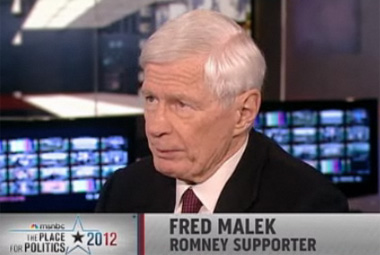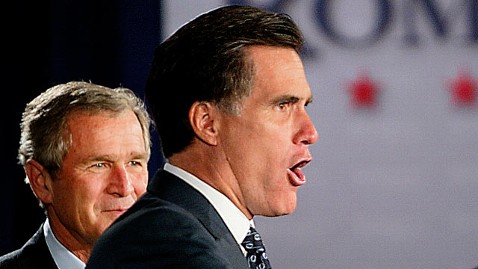Today’s history lesson: CaterAir, George W. Bush (and Marriott)
In July 2003, the founder of the Carlyle Group, David Rubenstein, chatted with company investors and made several tape-recorded comments about a former director at one Carlyle subsidiary. The subsidiary was an ill-fated airline-food company named CaterAir International Corporation, a spin-off from Marriott, and the director was George W. Bush:
“But when we were putting the board together, somebody came to me and said, look there is a guy who would like to be on the board. He’s kind of down on his luck a bit. Needs a job. Needs a board position. Needs some board positions. Could you put him on the board? Pay him a salary and he’ll be a good board member and be a loyal vote for the management and so forth.”
“I said well we’re not usually in that business. But okay, let me meet the guy. I met the guy. I said I don’t think he adds that much value. We’ll put him on the board because–you know–we’ll do a favor for this guy; he’s done a favor for us. We put him on the board and spent three years. Came to all the meetings. Told a lot of jokes. Not that many clean ones. And after a while I kind of said to him, after about three years–you know, I’m not sure this is really for you. Maybe you should do something else. Because I don’t think you’re adding that much value to the board. You don’t know that much about the company.”
“And I said, thanks–didn’t think I’d ever see him again. His name is George W. Bush. He became President of the United States. So you know if you said to me, name 25 million people who would maybe be President of the United States, he wouldn’t have been in that category. So you never know. Anyway, I haven’t been invited to the White House for many things.”
Audio of Rubenstein’s becoming candor can be found at Pacifica among other sites.
CaterAir was founded in 1989, spun off partly from Marriott Corporation by a private investors group including prominent Bush supporters Daniel J. Altobello and Frederic V. Malek. Auspices were poor. Airline-food jokes aside, Marriott, which had founded the airline catering industry, reportedly let its airline catering division go because of thin profits and uncertainties in the airline industry. However, it also provided a place for the future candidate for Texas governor and the White House.

George W. Bush
The Carlyle Group, where George H. W. Bush joined the board after leaving the White House, gave George W. Bush the directorship at CaterAir in 1990. Bush left in 1994 to run for Governor of Texas. Here is a partial chronology of CaterAir’s bumpy career:
- February 1990: CaterAir restructures its longterm debt, withdrawing an earlier SEC filing for $110 million and going for $40 million more. Eastern Airlines, which went bankrupt, was one earlier CaterAir client.
- May 1990: Merrill Lynch, a large brokerage firm with its own ties to the Bush clan, shops $250 million in refinancing for CaterAir, characterized in the business press as a high-risk, high-yield junk bond.
- August 1990: CaterAir completes its refinancing with a bridge loan. Following the collapse of the junk bond market, two senior Merrill Lynch executives who led the company’s foray into junk bonds resign. Bridge loans like the one to CaterAir are expected to become fewer.
- December 1990: CaterAir awards a contract to a California company to develop “a robotics system for its in-flight catering operations” including wrapping food.
- March 1991: Carlyle Group persuades Saudi Arabia’s Prince al-Walid bin Talal to spend a half-billion purchasing part of America’s largest banking company, Citicorp, earning a commission. David Rubenstein says of Carlyle’s CaterAir purchase, “Despite the fact that the airline business is in trouble, the company is worth an enormous amount more than what we paid for it.” Malek is quoted by NYTimes as saying, “I thought George W. Bush could make a contribution to CaterAir.”
- December 1991: CaterAir freezes or rolls back wages on most of its 20,000 employees, in spite of winning 66 new contracts in 1991. Contracts with 48 air carriers in 28 cities include Virgin Atlantic at Boston’s Logan, All Nippon at JFK in New York, and Aerolineas Argentinas at Miami’s airport.
- June 1992: CaterAir among other companies campaigns against a bill in the California state senate to tax airline food, saying the tax will hurt their ability to employ workers.
- August 1992: CaterAir says it is not restructuring its debt in spite of flat sales. Its joint ventures include Russia’s Aeroflot, the former national airline of the Soviet Union, operating a kitchen that caters to all flights through Moscow.
- August 1992: a former Marriott official pleads guilty to embezzling $1.4 million over 14 years, using fraudulent invoices from several vendors including CaterAir.
- October 1992: Carlyle buys part of General Dynamics Corporation, part of a two-year process becoming one of the nation’s largest military contractors. Carlyle also completes purchase of a Washington, DC, radio station and two stations in Virginia; is said looking to buy more stations after FCC expansion of allowable number of stations in a market to 18 for one owner, up from 12.
- December 1992: an article in the Journal of the American Medical Association describes an outbreak of illness suffered by passengers including several Minnesota Vikings back in 1989. Federal and state epidemiologists trace the problem to Marriott food handlers who did not wash their hands. Shigellosis, from bacteria found in human feces, confirmed or probable in about 240 cases of passenger illness. This division became CaterAir.
- December 1992: CaterAir’s St. Croix facility is closed down by the Food & Drug Administration (FDA) for five days, until it cleans up its kitchen and complies with FDA sanitation regulations. The St. Croix is given a poor 57% rating and classified “Not Approved.” Problems identified include “rodent pellets on a tray of salad plates” and elsewhere; “live flies throughout the kitchen”; “cockroaches on the kitchen floor and tray assembling room”; “old food and grease encrusted on the stove and food storage shelves”; etc.
- January 1993: George H. W. Bush leaves office.
- April 1993: CaterAir is now the nation’s largest airline caterer.
- May 1993: George W. Bush resigns from CaterAir. The FDA’s magazine, FDA Consumer, publishes an article about its five-day closing down of the St. Croix catering operation back in December, titled “Caterer Cleans Up, Flies Right.”
- July 1993: company sells an Orlando, FL, property for $3.4 million.
- August 1993: CaterAir files with the SEC to sell another $230 million in notes.
- November 1993: company announces it will relocate its corporate headquarters to Bethesda, MD, from Potomac, MD. Bush resigns from board of Harken Energy.
- April 1994: a federal court rules against CaterAir in company’s appeal of an NLRB decision.
- June 1994: at a Chief Executive Roundtable, CaterAir International’s Altobello discusses his company’s “passport for success” program, said to recognize employees who provide exceptional service.
- September 1994: Governor Ann Richards’ reelection campaign runs an ad criticizing GWBush’s business experience, saying that companies where Bush served lost a combined $371.6 million. The campaign publishes a handout titled The Bottom Line: The Business Career of George W. Bush. While the companies lost $371 million, the campaign says, Bush made $1.3 million. CaterAir lost $285.1 million during Bush’s stint on board; Bush received $75,000. The Bush campaign responds within hours, complaining about Richards’ “personal attacks.”
- September 1994: Daniel Altobello says Bush cannot be held responsible for losses at the company.
- October 1994: business experts, unnamed, defend Bush on grounds that his company role was limited to attending quarterly meetings.
- August 1995: Carlyle’s purchase of CaterAir is described as a “disaster.”
- February 2001: George W. Bush, now President, signals willingness to get involved in airline mechanics union negotiations with Northwest Airlines. A former president of Northwest is Frederic Malek, who put Bush on CaterAir’s board; Malek is still a major Northwest shareholder.
- Et cetera.
Be it noted that senior and longtime GOPer Malek’s ties with Republican presidential campaigns continue to the present.

Malek on television
Be it also noted that the counter-arguments, if you call them that, rolled out to obscure George W. Bush’s business record in the 1994 election–in Texas–strongly resemble those being used in the 2012 election by Mitt Romney. He’s No Longer With the Company, He Had Nothing to Do With Those Decisions, He Didn’t Do All That Much To Begin With etc.
Moving forward–
Is this another reason why Romney hasn’t released his tax returns? –That they would disclose yet more of Romney’s ties to the Bush team and to GWBush’s business and political career, now in some ill favor?

Romney with Bush
Then there is the larger problem, larger, that is, than one man’s political career. We report, you decide: who is mainly responsible for the airlines’ troubles? Minimum-wage-paid ill-trained lower-level employees? Or overpaid and under-performing ‘managers’ who spent decades lobbying for every conceivable tax break, government giveaway, and executive privilege, while resisting every improvement in security, safety, and even cleanliness–and simultaneously using the existence of government agencies as a way to claim that their food, for example, is safe?
As in the article linked, one of the company’s first claims about food-borne illness is that the FDA helps it prevent same.
